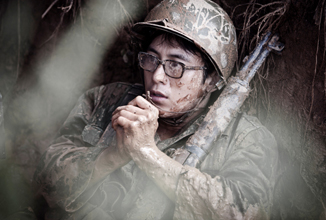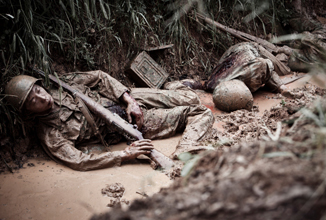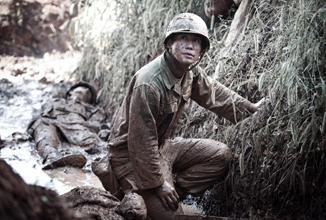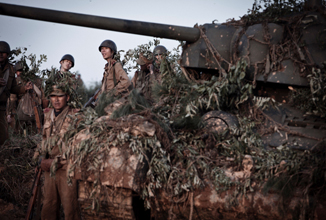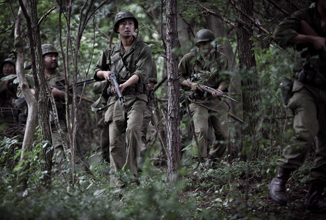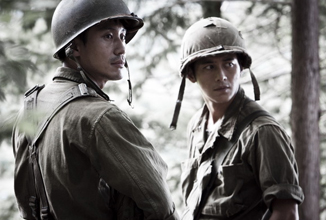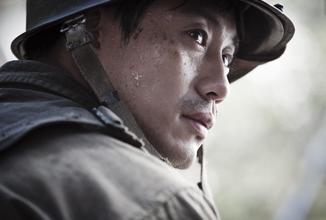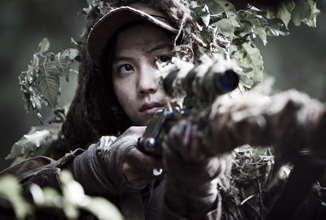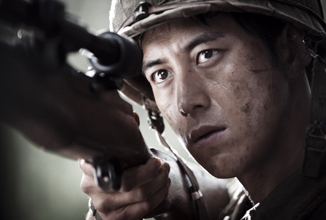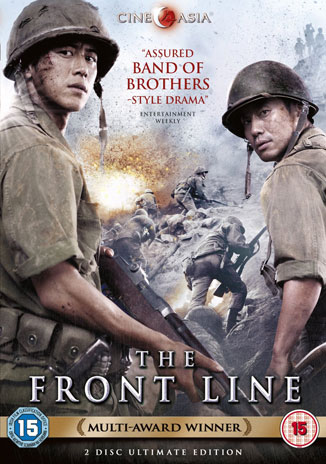
 |
|||||||||
As the Korean War rages in its third year, Eun-pyo (Shin Ha-kyun) - a soldier in the CIC unit of the South Korean army dealing with suspected communist activity in the ranks - is sent to the Eastern Front to investigate a possible North Korean mole in the South's Alligator regiment at the front line. On his arrival, he finds a dishevelled, war-weary troop of soldiers, led by a young morphine-addicted officer, attempting to secure (and keep) possession of Aerok Hill, an area that has switched between North and South Korean control thirty times in the previous eighteen months.
Review: There is a flashback scene in The Front Line (one of several) that takes us back to an earlier confrontation between Eun-pyo, Su-hyuk and the commander of the North Korean forces at the front line. In it, the Northern commander asks our two heroes if they know why their side is losing and, when they fail to answer, claims the reason is that they don't know what they're fighting for. That piece of dialogue is referenced again at a much later stage in proceedings and, in fact, ultimately lies at the very heart of what The Front Line is trying to say. For here we have a war in which the two opposing sides were, not that long before, one nation - a long and vicious battle where sometimes even families were split by their location on either side of the line drawn, so bloodily, between North and South.
When Eun-pyo first arrives at the Eastern Front, he is a man certain of his ideological beliefs and is instantly shocked by the apparent cold-heartedness of Alligator troop, and especially of Hu-syuk. However, as the events unfolding around him begin to take a similar toll on him he gradually realised that he too must shut his feelings, emotions and empathy down if he is to save his sanity and make it through to the end of the war at all. Of course, the fact that the Korean war never officially 'ended' (an armistice agreement brought an end to the fighting but a full peace treaty was never signed) serves to add an extra level of poignancy to any film about this 'Forgotten War' - as it is often described - and ultimately results in The Front Line not only having a topicality, in a sense (especially considering ongoing tensions between North and South that continue to the present day), but also a worthiness to it that certainly can't be found in any war film about a horse, Oscar nomination or not.
The script for The Front Line was written by Park Seon-yeon, who also wrote the book DMZ which formed the basis for Park Chan-wook's 2000 film JSA (Joint Security Area), and there are a couple of fairly obvious similarities between the two films - the investigation of a seemingly suspicious incident by an outside individual, and the almost 'bonding' interactions between Northern and Southern forces - but while The Front Line could only realistically ever dream of emulating Park Chan-wook's stunning film, it easily serves it's purpose, nonetheless.
Visually, The Front Line is everything you would expect from an award winning blockbuster of a war film such as this, and while imagery of mud-strewn, bloody and corpse-laden battles could never be described as beautiful, there is a noticeable sumptuousness to the visuals throughout the film, nonetheless. These scenes really step up to the mark and pull no punches whatsoever in doing so, and director Jang Hoon's efforts to maintain a human element to the narrative at all times deftly allow the ongoing tension to be further added to by the striking imagery present.
Shin Ha-kyun and Ko Soo (as Eun-pyo and Su-hyuk, respectively) both give accomplished performances throughout The Front Line - each of their portrayals easily invoking as much viewer empathy as the narrative will allow - and though the narrative depth given to each of their characters within the story could have been greater, they both still manage to successfully get the required themes across. Main Cast: Director: Jang Hoon |
|||||||||
DVD and Blu-Ray: The Front Line will be released on DVD and Blu-Ray in the UK by Cine Asia on February 27th, 2012. Specifications plus details of the Special Features included in the release are given below: DVD Details: • Director: Jang Hoon
• Audio commentary by Bey Logan All images © Cine Asia, Showbox Entertainment and Mediaplex Review © Paul Quinn |
|||||||||
